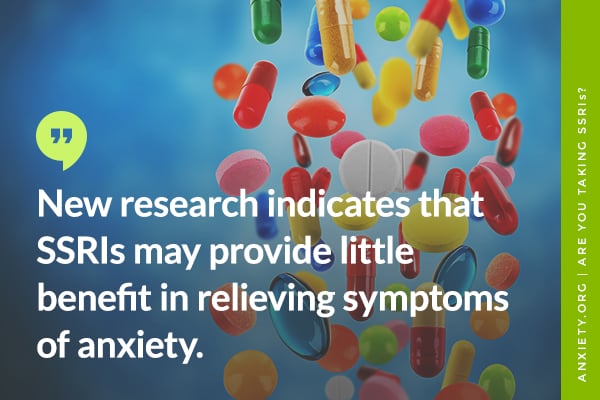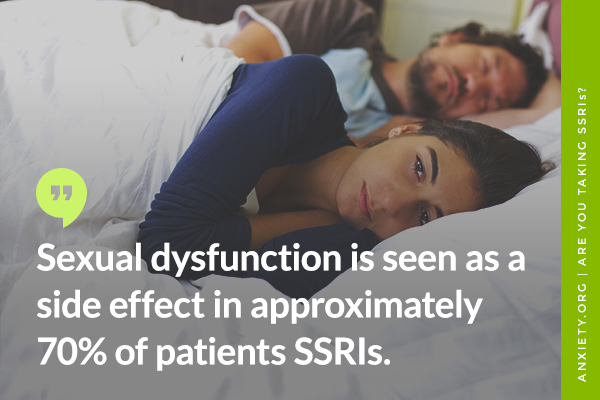Doctors often prescribe antidepressants, such as paroxetine (Paxil), fluvoxamine (Luvox), or sertraline (Zoloft), for the treatment of anxiety. Many antidepressants fall into the category of medications called selective serotonin reuptake inhibitors (SSRIs) and are approved for the treatment of anxiety disorders, such as Generalized Anxiety Disorder and panic disorder. However, new research indicates that SSRIs may provide little benefit in relieving symptoms of anxiety.
Our group of researchers at Wayne State University and the Harvard Medical School analyzed all clinical trials examining the benefit of the SSRI paroxetine compared to placebos in the treatment of Generalized Anxiety Disorder (GAD) or panic disorder across all trials sponsored by the drug’s manufacturer, GlaxoSmithKline (GSK). According to GSK, 12 clinical trials have been done, although four of them were not published in medical journals. We examined how much improvement individuals in these studies made on the Hamilton Rating Scale for Anxiety, one of the most frequently used measures of anxiety symptoms. The scale has a maximum score of 56 points. Higher scores represent more severe symptoms of anxiety. At the beginning of the trials, the average scores in each sample were between 19 and 26 points.
We found that during these relatively short trials of 8 to 12 weeks, the average improvement for individuals given paroxetine was 11.1 points, and 8.8 points for individuals given placebo. That is, the drug provided an average benefit over placebo of only 2.3 points on a 56-point scale, and the improvement for individuals given placebo matched 79 percent of the improvement for individuals given the drug. The benefit of the drug was lower in the unpublished trials, indicating that the published studies may have overestimated the drug’s effectiveness.
Our study is the first large-scale analysis of an SSRI compared to placebo in the treatment of anxiety; previous analyses have focused on the treatment of depression. Although our study is limited to only one medication, previous studies have found that all second-generation antidepressants have comparable effectiveness in treating depression.1 Thus, our results may generalize to other antidepressants, although further studies are necessary to support this proposition.
Antidepressants’ Benefits may not Outweigh Risks
Overall, the benefit provided by paroxetine in the treatment of anxiety is small. As a result, the benefit may not be substantial enough to warrant a recommendation for them to be used as a first-line treatment in clinical practice, given the side effects associated with SSRIs.
One common side effect of SSRIs is treatment-induced sexual dysfunction. Sexual dysfunction is seen as a side effect in approximately 70 percent of patients taking paroxetine, and most other SSRIs produce similar rates.2 Other side effects include drowsiness, insomnia, and long-term weight gain. Rare but more severe risks include increased suicidal thoughts in children and young adults and serotonin syndrome, a life-threatening adverse reaction to the medication. Furthermore, patients are much more likely to disclose negative side effects on a questionnaire rather than tell their doctor about it, which is the traditional method of obtaining side effect data in clinical trials.3 Thus, published findings may underestimate the true level of adverse effects. In addition to side effects while taking antidepressants, there are also withdrawal effects following discontinuation of the medicationthat may trigger a relapse of symptoms.4 These withdrawal effects may help to explain why most people stay on antidepressants for two years or longer.5
But Treating Anxiety is Within the Reach of Many
Many people report experiencing a great deal of benefit from antidepressants for their anxiety. However, because individuals given placebos experience a similar benefit that was almost 80 percent as effective, most of their improvement is not due to the specific ingredients in the drugs. Notably, people who receive placebos fare much better than those given no treatment at all, such as individuals on waiting lists to be enrolled in the clinical trials.6 These findings indicate that taking action to enroll in a treatment program and participating in some type of intervention may be therapeutic in itself. The belief that an individual is receiving treatment (even if that treatment is as simple as a daily sugar pill) is a major component of symptom relief. The specific chemicals in the drugs may be less responsible for the improvement, and these drugs come with risks.
Psychotherapy is another treatment option for individuals suffering from anxiety. It does not carry the antidepressant-related risks such as the side effects and withdrawal effects and a recent study found that 75 percent of patients prefer therapy over psychiatric medications.7 Short-term studies have shown comparable effectiveness between antidepressants and psychotherapy. However, longer comparisons show a clear superiority for psychotherapy over antidepressants.8,9 Psychotherapy, when conducted properly, is aimed at not only providing support and relieving symptoms, but also at helping individuals to develop and practice skills to prevent future occurrences of similar symptoms. This skill development is absent with medication intervention and may be part of the reason for psychotherapy’s long-term superiority as a treatment.
Our study demonstrates that paroxetine provides only a modest benefit in treating anxiety. We believe that this benefit is not large enough to justify SSRI use for anxiety, given the risks associated with the medication. For individuals looking to take control of their anxiety, it is important to understand the limitations of antidepressants and to know that other options are available. Talk with your doctor about psychotherapy and other treatment options that could be well suited to you and your symptoms.
Sources
1Gartlehner G, Hansen RA, Morgan LC, Thaler K, Lux L, et al. (2011) Comparative benefits and harms of second-generation antidepressants for treating major depressive disorder: An updated meta-analysis. Ann Intern Med 10.7326/0003-4819-155-11-201112060-00009.
2Serretti A, Chiesa A (2009) Treatment-emergent sexual dysfunction related to antidepressants: a meta-analysis. J Clin Psychopharmacol 10.1097/JCP.0b013e3181a5233f
3Zimmerman M, Galione JN, Attiullah N, Friedman M, Toba C, et al. (2010) Underrecognition of clinically significant side effects in depressed outpatients. J Clin Psychiatry 10.4088/JCP.08m04978blu
4Rosenbaum JF, Fava M, Hoog SL, Ascroft RC, Krebs WB (1998) Selective serotonin reuptake inhibitor discontinuation syndrome: a randomized clinical trial. Biol Psychiatry 10.1016/S0006-3223(98)00126-7
5Pratt LA, Brody DJ, Gu Q (2011) Antidepressant use in persons aged 12 and over: United States, 2005-2008. NCHS Data Brief 76: 1-8
6Kirsch I, Sapirstein G (1998) Listening to Prozac but hearing placebo: A meta-analysis of antidepressant medication. Prevention and Treatment 10.1037/1522-3736.1.1.12a
7McHugh RK, Whitton SW, Peckham AD, Welge JA, Otto MW (2013) Patient preference for psychological vs pharmacologic treatment of psychiatric disorders: a meta-analytic review. J Clin Psychiatry 10.4088/JCP.12r07757
8Imel ZE, Malterer MB, McKay KM, Wampold BE (2008) A meta-analysis of psychotherapy and medication in unipolar depression and dysthymia. J Affect Disord 10.1016/j.jad.2008.03.018
9Spielmans GI, Berman MI, Usitalo AN (2011) Psychotherapy versus second-generation antidepressants in the treatment of depression: a meta-analysis. J Nerv Ment Dis 10.1097/NMD.0b013e31820caefb
10Michael Sugarman, Amy Loree, Boris Baltes, Emily Grekin, Irving Kirsch. The Efficacy of Paroxetine and Placebo in Treating Anxiety and Depression: A Meta-Analysis of Change on the Hamilton Rating Scales.PLOS ONE, 27 August 2014; DOI:10.1371/journal.pone.0106337
Michael Sugarman obtained a Bachelor of Science in brain and cognitive sciences from the University of Rochester in 2009. He is currently a doctoral candidate in clinical psychology at Wayne State University in Detroit, MI and a predoctoral fellow at the Institute of Gerontology. He is an active researcher, clinician, and teacher.
Sugarman’s research projects include analyzing the effectiveness of antidepressant medications and examining risk for Alzheimer’s disease using functional magnetic resonance imaging (fMRI). He has previously completed clinical internships at John D. Dingell Veterans Affairs Medical Center and the Rehabilitation Institute of Michigan in Detroit, MI. Currently, Sugarman conducts individual and group psychotherapy and supervises junior graduate students at the Wayne State University Psychology Clinic, which provides affordable mental health services to the metro Detroit area.





